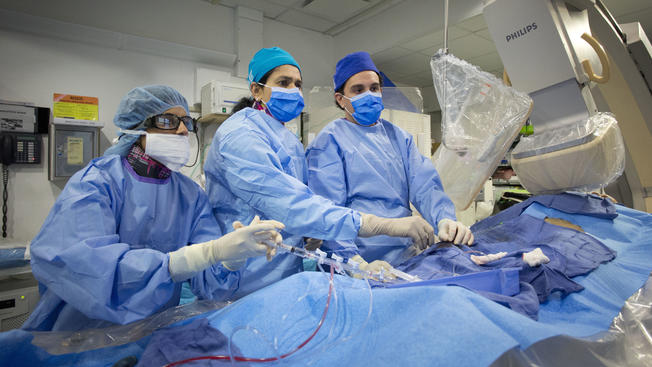New York City hospitals are among those across the country that have set a record for how quickly they open blocked arteries, averaging under one hour for the first time since these results have been tracked. More than 93 percent of patients now have their arteries opened within the recommended 90 minutes of arrival. It’s based on records from about 85 percent of U.S. hospitals that do the artery procedure, angioplasty.
Through a blood vessel in the groin or an arm, doctors guide a tube to the blockage causing the heart attack. They inflate a tiny balloon to flatten the clog, and leave behind a mesh tube called a stent to prop the artery open. The sooner blood flow is restored, the less chance of permanent damage.
“It’s one of the few things in medicine where time, literally seconds, is of the essence. It’s where the phrase ‘time is muscle’ comes from,” said Dr. Ajay Kirtane, director of the lab that performs angioplasties at New York-Presbyterian/Columbia University Medical Center. The risk of dying goes up 42 percent if care is delayed even half an hour beyond the 90 minutes that U.S. guidelines say patients should be treated after arrival.
But all that speed by the hospital won’t do much good unless patients act fast, too, and call 911 if they think they might be having a heart attack.
The warning signs:
- Discomfort in the center of the chest lasting more than a few minutes, or that goes away and comes back. It can feel like pressure, squeezing, fullness or pain.
- Pain or discomfort in one or both arms, the back, neck, jaw or stomach.
- Shortness of breath, which might include breaking out in a cold sweat, or feelings of nausea or lightheadedness.
“For women, the symptoms may not be the same. It may not be the typical chest pain” but rather abdominal pain, nausea or unusual tiredness, said Dr. Annapoorna Kini, a cardiologist at Mount Sinai Hospital in New York City. What to do? “Get medical help,” she said. “It’s better to worry after” about whether it was really a stomach problem rather than a heart attack.
Excerpt from NBCNewYork.com





















